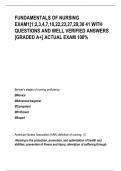FUNDAMENTALS OF NURSING
EXAM1[1;2,3,4,7,10,22,23,27,29,30 41 WITH
QUESTIONS AND WELL VERIFIED ANSWERS
[GRADED A+] ACTUAL EXAM 100%
Benner's stages of nursing proficiency:
ØNovice
ØAdvanced beginner
ØCompetent
ØProficient
ØExpert
American Nurses Association (ANA) definition of nursing: (1)
•Nursing is the protection, promotion, and optimization of health and
abilities; prevention of illness and injury; alleviation of suffering through
,the diagnosis and treatment of human response; and advocacy in the care
of individuals, families, communities, and populations.
The International Council of Nurses definition of nursing: (1)
Nursing encompasses autonomous and collaborative care of individuals
of all ages, families, groups, and communities, sick or well, and in all
settings. Nursing includes the promotion of health; prevention of illness;
and the care of ill, disabled, and dying people. Advocacy, promotion of a
safe environment, research, participation in shaping health policy and in
patient and health systems management, and education are also key
nursing roles.
ANA standards of nursing practice (1)
Assessment
Diagnosis
Outcomes identification
Planning
,Implementation
Evaluation
ANA Standards of Professional Performance (1)
1. Ethics
2. Education
3. Evidence-Based Practice and Research
4. Quality of Practice
5. Communication
6. Leadership
7. Collaboration
8. Professional Practice Evaluation
9. Resources
10. Environmental Health
code of ethics (1)
A code of ethics is the philosophical ideals of right and wrong that define
principles used to provide care.
, professional roles (1)
•Autonomy is an essential element of professional nursing that involves
the initiation of independent nursing interventions without medical orders.
Accountability means that you are responsible professionally and legally
for the type and quality of nursing care provided.
•As a caregiver, you help patients maintain and regain health and find their
maximum level of independent function through the healing process. A
patient’s health care needs include the patient’s emotional, spiritual, and
social well-being.
•As a patient advocate you protect your patient’s human and legal rights
and help patients assert those rights when needed.
•As an educator, your teaching can be formal or informal. Always use
teaching methods that match your patient’s capabilities and needs, and
incorporate other resources, such as the family, in teaching plans.
•Your effectiveness as a communicator is central to the nurse—patient
relationship. It allows you to know your patients, including their strengths,
weaknesses, and needs. You will routinely communicate with patients and
families, other nurses and health care professionals, resource people, and
the community.
•As a manager, you will establish an environment for collaborative patient-
centered care to provide safe, quality care with positive patient outcomes.




